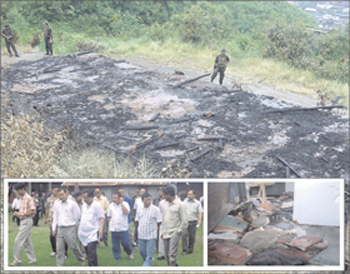TODAY -
| Burning down of schools: Bound to happen, really? | |||
Amar Yumnam * |
|||
|
First, due to interplay of various factors it is possible that the district level government functionaries have now been incapacitated. Secondly, due to continuous neglect over the years, the local organizations feel that aggravating an issue to a level drawing the attention of the highest authorities in the State is the only means to get needed government attention. Thirdly, there could be forces now actively involved to deepen the fractionalization in the State. Fourth, it could be that the bureaucracy in the State is so incompetent as to address and handle any issue, and naturally the latter getting aggravated. With this pondering, let us now turn to the rationalization of arson of schools. Compelling reason: The first rationalization for the burning down of schools is that it was “bound to happen”. The question to be asked is: Can there be any compelling reason whatsoever, unless it houses the enemy forces, for burning down of schools? I would hasten to add that there can never be. Manipur has a long tradition of blaming and cursing the Nasikhong when the Thingel could not be stopped, and it continues at a huge cost to the society. A teacher may have ideological leanings, knowingly or unknowingly. A curriculum can have an agenda, and, in fact, should have one. A group may or may not agree with this agenda. A book may contain lessons to the dislike of a group. But a school structure is a neutral asset; it does not take sides. It accommodates all views, allows all types of teachings and tolerates all faiths. It is an asset which simply takes time to create and needs sacrifices to maintain. To burn down such structures as ‘bound to happen’ can be the most illogical act whatsoever. There is another aspect to be seen as well. While the grudge is against the government, the schools are located in the context and villages themselves. Burning down the school structure in my own village because I have a complaint against the government, definitely not headquartered in my village, is not different from killing Jesus for we have grudges against the Father. It is the same school structures which should be used even if different curricula are to be adopted. One may respond that new ones would be constructed, but just amounts to incurring double expenditure for a single cause. Is it rational or justifiable? Having discussed the rationalisation of the immediate arson, let me now turn to another issue which has been raised as part of the rationalisation. My Fear: My greatest fear right now is that, over the years, the articulations in the mountains of Manipur are having the effect of sacrificing the common economic interests while at the same time not allowing the sharply emerging economic disparities, within the existing property rights structures, from getting manifested. The opposition to creating townships in the mountain areas goes against the logic of global development experience and the very logic of development. The ultimate development goal is to make the urban-like amenities available even in the rural areas. But the continued opposition from the mountain elites to the creation of townships in the mountain areas can only be a veiled attempt to make the common mountain people subservient to the elites ad infinitum. The government development investment and benefits in the rural areas are largely individual oriented, and thus can be used to make the beneficiaries feel obligatory to the local powers. The urban development interventions, on the other hand, are largely common amenities oriented, and so definitely much broader based than in the case of rural interventions. There is very little scope to make the common people feel obligated to the powers that be in the case of urban interventions. Whatever the case, the fact of economics is that the urban based interventions can bring about a more diversified development. These interventions equally foster a spirit of competition based on specialization and competence. These are exactly those needed to be instilled among the mountain population if we are to take on the emerged and emerging challenges head-on. We know, but still..: We know for sure that the government of Manipur is incompetent, lacks vision, and above all has not yet articulated a development agenda for the mountains of Manipur. But this can never be enough reason for destroying whatever facilities we have in our own local mountain areas in a Thingel-Nashikhong like approach. Besides, we should be conscious of the development scenarios getting unfolded at a very fast pace, and apply our mind in articulating for interventions to enhance the well-being of the least privileged in the mountain areas. Nobody or no group has the right to usurp the rights of the common man to grow out of the limitations in the name of group articulation. While articulating political agenda, the development potential should not be compromised, and efforts should not be made by the elites to make the hard-working commoners permanently subservient. * Amar Yumnam writes regularly for The Sangai Express. This article was webcasted on July 08th 2007. |
* Comments posted by users in this discussion thread and other parts of this site are opinions of the individuals posting them (whose user ID is displayed alongside) and not the views of e-pao.net. We strongly recommend that users exercise responsibility, sensitivity and caution over language while writing your opinions which will be seen and read by other users. Please read a complete Guideline on using comments on this website.
LATEST IN E-PAO.NET
Jump Start
DBS Imphal SubSite |
Readers Mail |
Editorials |
Education Announcements |
Essay |
Exclusive Event |
Flash - Audio Visual |
Incidents |
LFS Imphal SubSite |
News Timeline |
Poetry |
Opinion |
Sports |
Rock Concert |
RSS |
Top Stories |
Wathi Jugai







